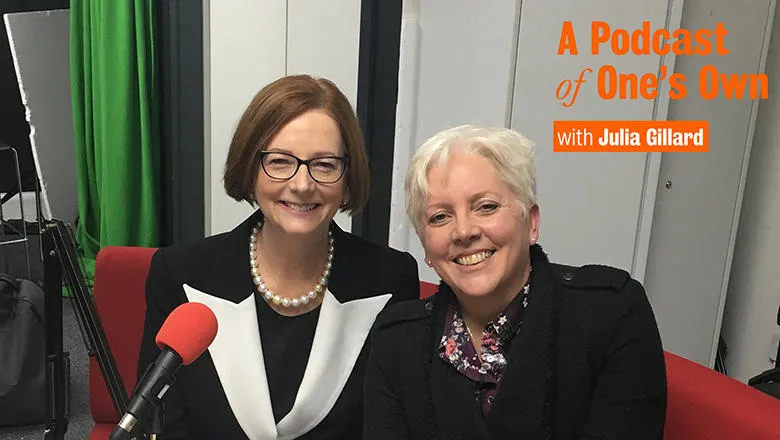14 November 2019
"I don't want to wait another half century for someone to get round to doing something in relation to a problem that I see as urgent" – Carrie Gracie on equal pay
In the latest episode of A Podcast of One’s Own, journalist Carrie Gracie tells her story about battling with the BBC over unequal pay.

Subscribe to a Podcast of One's Own
Journalist Carrie Gracie talks to Julia Gillard in the latest episode of A Podcast of One’s Own. Gracie, who was formerly BBC China editor, made headlines in early 2018 when she famously resigned from her post and went public on her battle with her employer over unequal pay.
She is now the author of Equal: A Story of Women, Men and Money, in which she shares her fight against the BBC to win equal pay and offers advice to women in similar situations.
In the podcast she tells Gillard about how the difficult experiences she had faced earlier in life, including her mother’s death, her daughter’s leukaemia and her own suffering with breast cancer, helped drive her to take action over pay injustice:
“Life is short, we have to do what matters, we have to put our shoulder to the wheel and do our best…I’m quite an impatient person as a result….I expect people to solve problems, I expect to solve problems, rather than sitting around thinking of reasons why we can’t solve a problem.”
So, on discovering by accident that the BBC was paying her male equivalent, the North America editor, almost twice as much, despite her having demanded equal pay when she took the China editor post, she was completely shocked:
“I’m someone who believes in living my values…and that’s certainly the job that I was doing on the frontline in China, facing surveillance, the occasional detention, quite a lot of censorship pressure, enormous time difference and reporting challenges of all kinds. And I felt that it’s not OK for the BBC to lose its moral compass at home when I’m out there trying to drive by the moral compass on the frontline.”
Gracie went through the internal complaints process at first to air her grievances, but far from it being the “good faith exercise” she’d hoped, it was enormously demanding and stressful:
“It feels like you’re being gamed, your employer has all the information, all the lawyers, all the experience of fighting these battles. And you as an employee are at risk of losing your job, of destroying your career prospects, of spending money on lawyers and damaging your financial security…they have to belittle your performance, they have to cut you down in order to explain why you were paid less than the relevant man.”
An experience which was echoed by the many women who wrote to her over this period, telling her about their own battles. The process culminated in a grievance hearing, where she was told that her request to be paid equally was turned down because she was “in development”. Whilst everybody around her including colleagues, friends and family found this funny, for her it was “very, very painful”:
“How could the BBC, which I’d worked for for three decades which is… a journalistic operation whose raison d’être is to tell the truth…how could it do that to me after that time?”
Throughout the incredibly difficult experience, she talks about how the “hive mind” and “hive heart” of fellow female colleagues at the BBC helped her keep fighting on:
“If you have a group of comrades and sisters fighting it together, you can help to hold up the mirror to each other, and you can believe that you yourself are rubbish…but if you see the management say it of someone you know is brilliant…you know it’s rubbish and you just feel indignant on her behalf…if you’re all doing it for each other then the fight is stronger.”
After a year of fighting her battle, just as she was gearing up for legal action, the BBC finally caved in and acknowledged her right to be paid equally, awarding her the full amount of backpay. For Gracie it was “never about the money”, so she gave it all away to help support low-paid women fighting against unequal pay, having been “horrified by how hard the experience was” and having received so many “heart-breaking” stories from women who were fighting their battles completely alone.
Gracie is clear that things won’t change in this area until people start talking more about pay, which is her advice to women everywhere:
“Unfortunately the world is constructed so that there is still a large measure of pay secrecy and behind that wall of pay secrecy there is a lot…of conscious and unconscious bias, which hurts women….and the law is not adequate at protecting you…read the gender pay gap of your organisation, look at whether the leadership of your organisation looks like you…talk to other colleagues men and women about pay.”
“I found it incredibly awkward talking about pay…but I’m really glad I didn’t go to my grave not knowing the facts of life in this respect.”
You can find this episode and previous episodes of A Podcast of One’s Own, on all the main podcast platforms.
